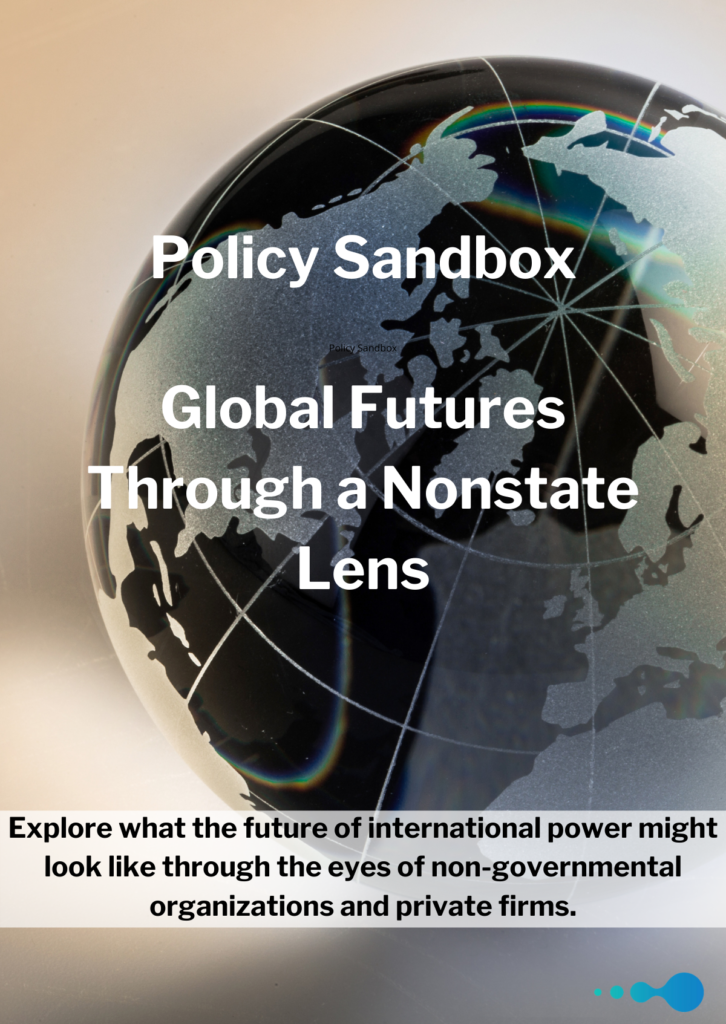Announcing the Prescient Policy Sandbox: Global Futures through a Non-state Lens
The National Intelligence Council’s Global Trends report has been a vital resource to policymakers since the 1990s. The latest report, Global Trends 2040, hints at a question that Prescient has been researching for years: How long can non-state power rise before it affects the state-led international order?
Today, there are clear indications that the power and responsibility for governing are growing diffuse. Central governments are losing their monopoly on governance.
This does not mean that governments play no role. Rather, they have to work with private sector actors or others who have agency and power of their own. Their roles are complicated by necessary engagement with private actors.
Take these three recent issues in which private individuals and firms constrain meaningful government action.
Commercialization will shape the future of global power in outer space
The dramatic, if brief, recent flights to space by billionaires Jeff Bezos and Richard Branson are reminders of the dramatic steps taken to commercialize space. But the initial laws and regulations governing space exploration did not seriously consider that actors with wholly commercial purposes might want to one day venture into space.
While experts today agree that there need to be more rules governing the commercialization of space, they are not decided on what should happen. Some doubt that it would be possible today to generate enough international alignment for a new international treaty. Some suggest that wholly new institutions should be created that engage states, companies and civil society organizations in a “new culture of space governance.” Many suggest that the U.S. government should better regulate the nascent industry and require privatized space endeavors to be safe for all. Yet, it is worth noting how private space endeavors also permit people to have government-like powers, such as surveillance, which has unknown impacts.
Cybersecurity will not be achievable without the combined efforts of governments and businesses
The scope of cybercrime has vastly increased over the last decade and can have significant effects, as the attack on Colonial Pipeline, the largest fuel pipeline in the Eastern United States, demonstrated in May 2021.
New cybersecurity bills introduced in Congress to ensure that companies report cyber breaches and improve the ability to mitigate risk. But the interrelationships between actors will remain:
“Dealing with cyber-insecurity is hard because it blurs the boundaries between state and private actors and between geopolitics and crime. The victims of cyber-attacks include firms and public bodies. The perpetrators include states conducting espionage and testing their ability to inflict damage in war, but also criminal gangs in Russia, Iran and China whose presence is tolerated because they are an irritant to the West.”
The Economist).
That blurriness has led the World Economic Forum to suggest that pooling public and private resources, sharing intelligence, and deep public-private collaboration are necessary to address bad acts in a context where geopolitical and business risk mingle.
If intelligence is generated by amateurs for state use, is it still intelligence?
Gathering information about one’s adversaries or criminals has until recently been a government job only. As the barriers to access information have collapsed in the internet age, this formerly government-only task has opened up to eager amateurs. After the January 6th riots at the U.S. Capitol, intelligence collected by amateurs scouring the web for selfies was so valuable that law enforcement agencies began to solicit information from them. This fundamentally changes the nature of what intelligence is.
Explore the future of global power on September 22nd 2021
Join us on September 22nd as we explore what the future of global power might look like through the eyes of non-governmental organizations and private firms. In this inaugural Prescient Policy Sandbox, we will convene experts with a pulse on global trends to discuss the National Intelligence Council report and build collaborative scenarios on the future of non-state power.
Date: Wednesday, November 17th, 2021
Time: 11 a.m. to 1 p.m. EDT
Price: FREE
Place: Virtual event (link provided before the event)


